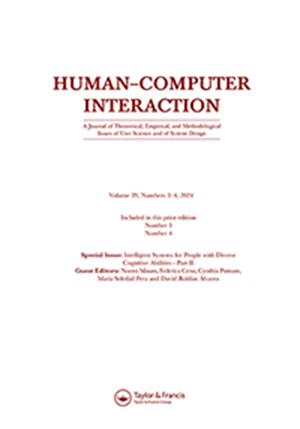Cats, Kids, and video calls: how working from home affects media self-presentation
IF 4.5
2区 工程技术
Q1 COMPUTER SCIENCE, CYBERNETICS
引用次数: 6
Abstract
ABSTRACT Working from home (WFH) in response to COVID has reduced boundaries between home and work roles. It has also reduced in-person interaction, replacing it with digital communication including Video and text. We use personality theory to compare self-presentation on these media versus in-person communication. We use surveys and interviews to examine media self-presentation before and during COVID, as well as between different groups of students and office workers. Pre-COVID students presented themselves as more Extraverted, more Agreeable, less Open, and less Neurotic on Video. On Texting they are less Open and Neurotic. During WFH, students are more Agreeable and less Neurotic on Video while still less Neurotic on Texting. The office worker WFH sample is more Agreeable and less Neurotic on Video. We discuss practical and theoretical implications of results, and future research directions. Keywords personality, self-presentation, Video, Texting, media theory, affordances, COVID, students, office workers ABOUT THE AUTHOR/S Lee Taber University of California, Santa Cruz ltaber@ucsc.edu I’m a graduate student at UCSC, interested in how people communicate using technology and how those communications affect us. I look at how people present themselves differently on Facebook and Snapchat, and why. I’ve examined self-presentation differences on main Instagram accounts as well as Finstas, or “fake” Instagram accounts. I’m also interested in parasocial relationships with lo-fi hip hop beats and how to make a more readable ToS. More here: http://leetaber.com/ Steve Whittaker University of California, Santa Cruz swhittak@ucsc.edu Technology is transforming our everyday lives, how we think, interact and feel. I work at the intersection of Social and Computer Science. I study how technology is affecting fundamental aspects of our everyday lives, and use insights from Social Science to design new digital tools to support memory and collaboration and to help manage personal information. My main current interest is in designing new technologies to promote well-being. Research Areas: Human-computer interaction, digital well-being, computational social science New Future of Work 2020, August 3–5, 2020 © 2020 Copyright held by the owner/author(s).猫、孩子和视频电话:在家工作如何影响媒体自我表现
应对COVID的在家工作(WFH)减少了家庭和工作角色之间的界限。它还减少了面对面的交流,取而代之的是包括视频和文字在内的数字交流。我们运用人格理论来比较这些媒体上的自我表现和面对面的交流。我们使用调查和访谈来检查在COVID之前和期间以及不同群体的学生和办公室工作人员之间的媒体自我表现。新冠肺炎前的学生在视频中表现得更外向、更随和、不那么开放、不那么神经质。在发短信时,他们不那么开放和神经质。在WFH期间,学生在视频上更随和,更不神经质,而在短信上更不神经质。在视频中,办公室职员WFH样本更随和,不那么神经质。讨论了研究结果的现实意义和理论意义,并展望了未来的研究方向。关键词个性,自我表现,视频,短信,媒体理论,启示,COVID,学生,办公室工作人员关于作者/S Lee Taber加州大学圣克鲁斯分校ltaber@ucsc.edu我是UCSC的一名研究生,对人们如何使用技术进行交流以及这些交流如何影响我们感兴趣。我研究人们在Facebook和Snapchat上如何以不同的方式展示自己,以及原因。我研究了主要Instagram账户和“假”Instagram账户上的自我表现差异。我还对低保真嘻哈节拍的准社会关系以及如何制作更可读的ToS感兴趣。更多信息请访问:http://leetaber.com/史蒂夫·惠特克加州大学圣克鲁斯分校swhittak@ucsc.edu科技正在改变我们的日常生活,改变我们思考、互动和感受的方式。我从事社会科学和计算机科学的交叉研究。我研究技术如何影响我们日常生活的基本方面,并利用社会科学的见解来设计新的数字工具,以支持记忆和协作,并帮助管理个人信息。我目前的主要兴趣是设计新技术来促进福祉。研究方向:人机交互、数字福祉、计算社会科学《工作的新未来2020》,2020年8月3-5日©2020版权所有人/作者所有。
本文章由计算机程序翻译,如有差异,请以英文原文为准。
求助全文
约1分钟内获得全文
求助全文
来源期刊

Human-Computer Interaction
工程技术-计算机:控制论
CiteScore
12.20
自引率
3.80%
发文量
15
审稿时长
>12 weeks
期刊介绍:
Human-Computer Interaction (HCI) is a multidisciplinary journal defining and reporting
on fundamental research in human-computer interaction. The goal of HCI is to be a journal
of the highest quality that combines the best research and design work to extend our
understanding of human-computer interaction. The target audience is the research
community with an interest in both the scientific implications and practical relevance of
how interactive computer systems should be designed and how they are actually used. HCI is
concerned with the theoretical, empirical, and methodological issues of interaction science
and system design as it affects the user.
 求助内容:
求助内容: 应助结果提醒方式:
应助结果提醒方式:


